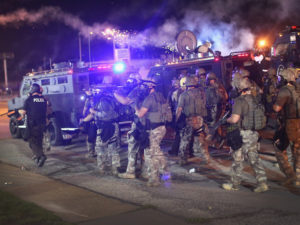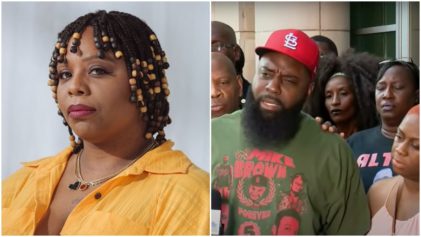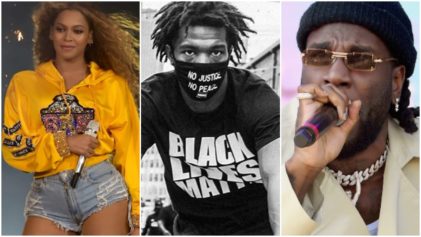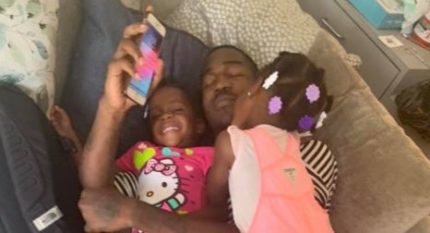As Ferguson police officer Darren Wilson walks away a free man, members of the Black community are left feeling like an “endangered species”—while it seems America’s so-called justice system has continued to empower white officers who are gunning down Black teens.
The decision by the grand jury was no shock, but the pain that filled the guts of Blacks all across the globe was still just as hard to bear.
With every ruling that protects a white police officer who has shot and killed an unarmed Black man, white police officers are empowered and Blacks are reminded of their value, or lack thereof, in the eyes of America’s justice system.
“We’ve seen this over and over again,” Terrie M. Williams, the author of “Black Pain: It Just Looks Like We’re Not Hurting” and co-founder of The New Legacy Leaders Project, said back in August when Brown was fatally shot by Wilson. “Where police brutality, directed primarily toward Black men, often renders the community, collectively and individually, into an extreme state of shock…it affects our men, our women and our children.”
In a short span of time, the country has bid farewell to New York father Eric Garner who was killed after being placed in an NYPD-prohibited chokehold by a New York officer; Savannah resident Charles Smith who was fatally shot by officers who claimed he suddenly brandished a weapon while in handcuffs despite several police putdowns; the 22-year-old Walmart shopper John Crawford who was shot by police after holding a BB rifle in the store; 12-year-old Tamir Rice, who was killed over the weekend by Cleveland police because he was holding a toy gun, and many more.
In all cases the police officers involved were not charged with the death of these Black men, or decisions are still pending, with many experts doubting that any serious charges will come.
Black men and women are left questioning their value in a country that seems determined to break them down physically, emotionally and psychologically through racist institutions that ensure a Black boy will spend more than 20 years behind bars for shooting a police dog (17-year-old Ivins Rosier in Florida) while a white police officer will walk away without so much as a slap on the wrist for killing an unarmed Black teen.
“They only want to see us in two places – in the ground or in the cell,” said Bradley Warren, a 26-year-old Georgia resident who participated in more than 5 demonstrations for Michael Brown before the grand jury decision was announced. “So what you have is people asking themselves, ‘How long does this keep happening until I believe it’s true? If I am allowed to be slaughtered like an animal, maybe I am an animal.’ It’s not that cut and dry but it’s a psychological issue.”
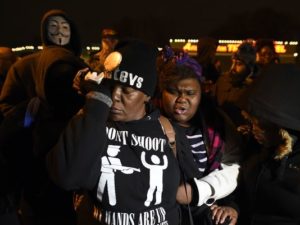
It’s the type of message that has been perpetuated throughout American culture and convinced people of color that they are the “others” simply looking for a space to occupy in the land of those whose lives actually matter to the justice system.
“I remember in high school the question was, ‘Why are all the Black people sitting together,’ ” recalled Dr. Dawn M. Porter, a board-certified child, adolescent and adult psychiatrist who has been practicing medicine for more than two decades. “But when you think about it, why are all the white people sitting together? You aren’t coming over to our table. It’s like it’s their world and if we aren’t in it then we are the ones being separatists…It’s American history. You talk about Black history as something separate.”
In the midst of these trying times, however, it is important that members of the Black community realize they do not have to continue on in silence.
Even in the wake of a tragic death and an all but too familiar feeling of a lack of justice, there is indeed a bright side to what is happening across the nation.
As Williams explained, the way to redefine strength in a community is to embrace emotions and let those cries of pain and for justice be heard.
“We often confuse being ‘strong’ with being silent,” she said. “True strength lies in knowing when to ask for help, when to let the tears flow, when you are overwhelmed. The death of Michael Brown is one that has taken a great toll on our collective psyches… no time for silence.”
It is through that sense of unity that Brown’s legacy may live on and have a powerful impact on the future of what was supposed to already be a “post-racial” America.
“This was more than just this verdict,” explained Dr. Porter. “People started talking about the issues that are really there that everybody has kind of been afraid to talk about.”
Now that the grand jury’s decision has been made, Dr. Porter just hopes that the Black community doesn’t let these types of global conversations die down.
“Often times we aren’t brought to the table or if we’re at the table we can’t speak,” Dr. Porter added, as she explained that Black people are raised in a society that encourages them not to speak out about matters of race and discrimination.“Sometimes we feel like, ‘Ok if I say something then I’m going to lose what I have or it’s going to be taken the wrong way.’ We are always feeling like we are a guest here.”
In order to combat this sense of otherness that plagues Black people across the globe, Dr. Porter said that it is just as important to rebuild our own communities with our own hands as it is to continue pushing conversations about racist institutions in mainstream media.
“So I think what really has to happen for our Black community is to find ways to strengthen our Black males through healthy – emotionally healthy – lives,” Dr. Porter said, before mentioning that many Black people will not seek help for the type of trauma and mental angst that can be caused by constant bouts with racism and discrimination. “We have to help our Black men become more resilient against these challenges of being faceless.”
